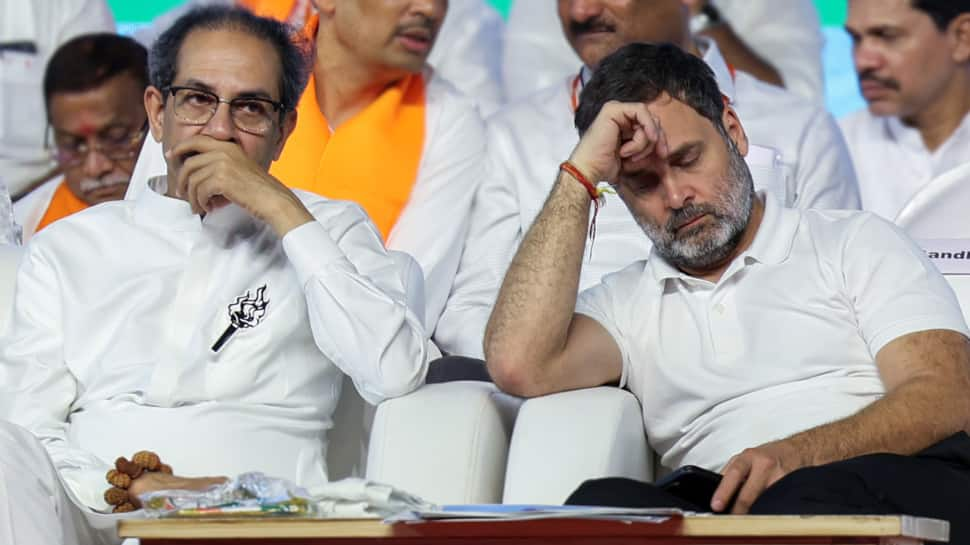 |
|
The recent Maharashtra Assembly election results have triggered significant internal debate within the Uddhav Thackeray-led Shiv Sena (UBT) faction, raising questions about the future of the Maha Vikas Aghadi (MVA) alliance. The resounding defeat of the MVA, a coalition comprising the Shiv Sena (UBT), Congress, and Nationalist Congress Party (NCP), has ignited a growing sentiment within the Sena to sever ties with its alliance partners and contest future elections independently. This sentiment is particularly pronounced among grassroots workers who feel overshadowed by the success of Eknath Shinde's faction, which won a substantial number of seats. The discussions within the party highlight a deepening fissure between those advocating for an independent path and those who remain committed to maintaining the MVA alliance to present a united opposition against the BJP.
The internal debate within the Shiv Sena (UBT) is far from monolithic. While a significant portion of MLAs, reportedly a majority, expressed support for breaking away from the Congress during a meeting convened by Uddhav Thackeray, key figures like Thackeray himself, Aaditya Thackeray, and Rajya Sabha MP Sanjay Raut are determined to preserve the alliance. This divergence in opinion underscores the complex political dynamics at play within the party. The post-election analysis within the Sena is further complicated by the perceived failure of the MVA to connect with voters and the criticism levied against Uddhav Thackeray for aligning with the Congress, a move seen by some as a betrayal of Balasaheb Thackeray's Hindutva ideology. This ideological divergence is a key factor contributing to the internal divisions and the questioning of the MVA's effectiveness.
The concerns expressed by the Shiv Sena (UBT) are not unique. The Congress, too, is grappling with internal discussions about its future electoral strategy. While Congress leaders acknowledge the sentiment among their ranks to contest independently, they emphasize the need for a thorough analysis of the election results before making any significant decisions. This reflects a cautious approach in the face of the significant electoral setback. The parallel internal debates within both the Shiv Sena (UBT) and Congress suggest a broader dissatisfaction with the MVA's performance and the possibility of a significant realignment of political forces in Maharashtra in the near future. The future of the MVA coalition now hangs precariously in the balance, contingent upon whether Uddhav Thackeray can effectively manage the internal dissent within his party and successfully navigate the complex political landscape of Maharashtra.
The situation is further complicated by reports of unrest within the MVA camp, with some MLAs reportedly considering switching to the ruling Mahayuti alliance. This potential defection adds another layer of uncertainty to the already volatile political climate. The instability within the MVA highlights the fragility of the coalition and the potential for further realignment as parties assess their electoral prospects. The coming months will be crucial in determining the future trajectory of the MVA and the Shiv Sena (UBT)'s role within it. Will Uddhav Thackeray succeed in maintaining the alliance, or will the pressure for an independent path ultimately prevail? The answer to this question will have significant implications for the political landscape of Maharashtra.
The election results themselves paint a stark picture of the current political dynamics in Maharashtra. The BJP's significant victory underscores its dominant position, while the relatively poor performance of the MVA indicates the need for introspection and strategic realignment. The defeat is not just a setback for the MVA, but also raises questions about the efficacy of coalition politics in the state. The analysis of the election results should go beyond simply determining the number of seats won or lost; it should delve into the reasons behind the electoral outcome, considering the role of ideology, alliances, and the effectiveness of campaign strategies. The future of Maharashtra's political landscape depends largely on how these parties respond to this election and the internal challenges they face.
In conclusion, the aftermath of the Maharashtra Assembly elections has brought to light significant divisions and uncertainty within the MVA coalition. The Shiv Sena (UBT)'s internal debate over its future within the alliance, mirrored by similar discussions within the Congress, highlights the need for strategic recalibration. The potential defections of MLAs to the Mahayuti further underscore the fragility of the MVA. The coming months will be critical in determining the shape of Maharashtra's political future and the ultimate fate of the MVA alliance.
Source: Uddhav Thackeray To Ditch Congress After Maharashtra Defeat? What Reports Say
